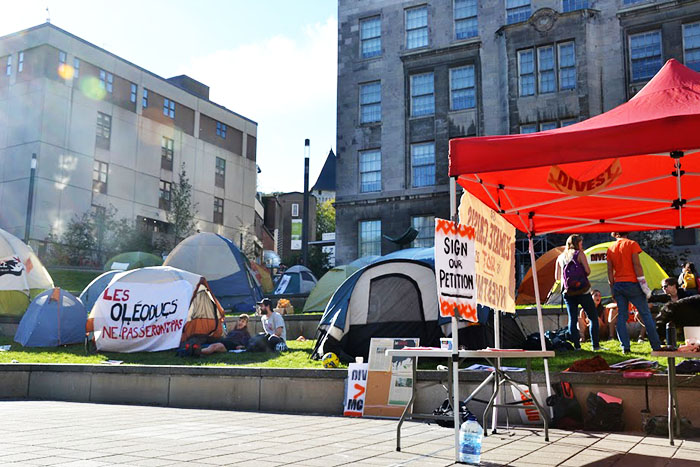From Sept. 21 to 25, Divest McGill held Fossil Free Week, a series of workshops, professor talks, and rallies to ask the university administration to divest from oil and gas industries. Divest McGill is an organization whose goal is to urge the university to divest its endowment from fossil fuel and tar sands companies such as Chevron, Suncor, and British Petroleum. Throughout the week, organizers also camped out in front of the James Administration Building to increase campus awareness of the divest movement.
Chloé Laflamme, a U2 biochemistry student and one of the organizers of Fossil Free Week explained some of the steps that have been taken to urge administration leaders to reconsider Divest McGill’s demands.
“We [sent an email to] Kip Cobbett, who is the chair of the Board of Governors, and the interim chair of the Committee to Advise on Matters of Social Responsibility (CAMSR),” Laflamme said. “[Suzanne Fortier, McGill Principal] […] was [also] CC’d on that email, to let them know about our main demands […] to have them recommend a freeze on fossil fuel investments while they look at their full petition for divestment.”
Laflamme stated that Fossil Free Week was established to showcase diversity within climate justice activism.
“We’re hoping to cater to a wide variety of people because this issue, in nature, is very intersectional [.] We’re definitely trying to reach out to the community,” she said.
Through a series of professor talks given at Community Square, McGill faculty members and community leaders discussed various reasons for divestment, including the impacts of climate change on indigenous peoples, the economic viability of oil investment, and the physical science behind anthropogenic global warming.
During a Sept. 22 talk entitled “Fossil Fuel and the Anthropocene,” Richard Janda, Professor of Law and Environmental Science, explained moral, ethical, and legal grounds for supporting divestment, and praised the week of activism.
“I am inspired by the students who have been working on the Divest McGill campaign,” he said. “The courage, the dignity that you’ve shown—but also the tenacity to bring ideas forward […] [have] been truly remarkable.”
Victor Frankel, a Biology Ph.D candidate and supporter of divestment, stated why he believed the university should divest.
“[Divestment] would be economically consistent with the university’s mission to fulfill its fiduciary duties to the students and to the community,” Frankel said. “But our focus is not on the economic argument that it makes sense to divest from these toxic assets. What we’re really pushing for is divestment on the moral grounds […] because these companies are responsible for social and environmental injury.”
In addition to on-campus events, Divest McGill members participated in a rally on Thursday, targeting the federal leaders’ French language debate held in Montreal. A contingent of various environmental protection organizations gathered in front of the Radio-Canada Building to protest a lack of climate justice.
One such protester, Divest McGill organizer Julianna Duholke, spoke about the campus-wide support of Fossil Free Week, and what this means for their campaign.
“Our campsite has actually tripled in size […] and we’ve gathered almost a thousand signatures just this week,” she said. “Now it’s really great to be tying this into the federal debate. We are not only holding McGill accountable, but trying to hold our federal leaders accountable, too.”








